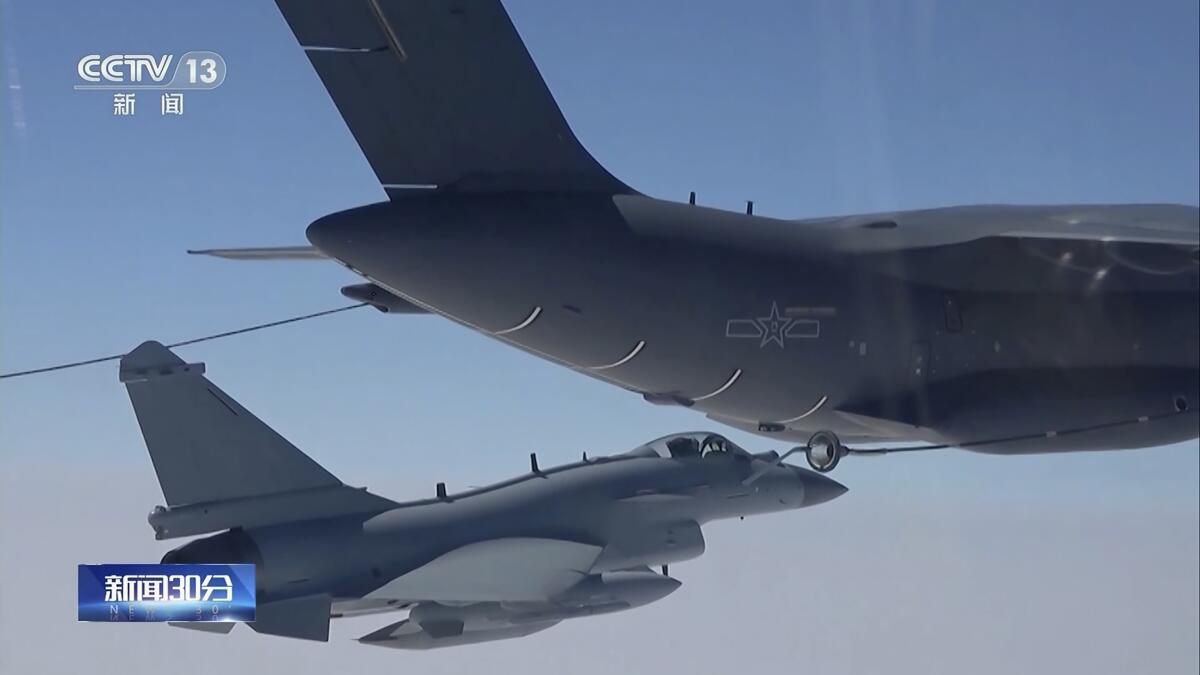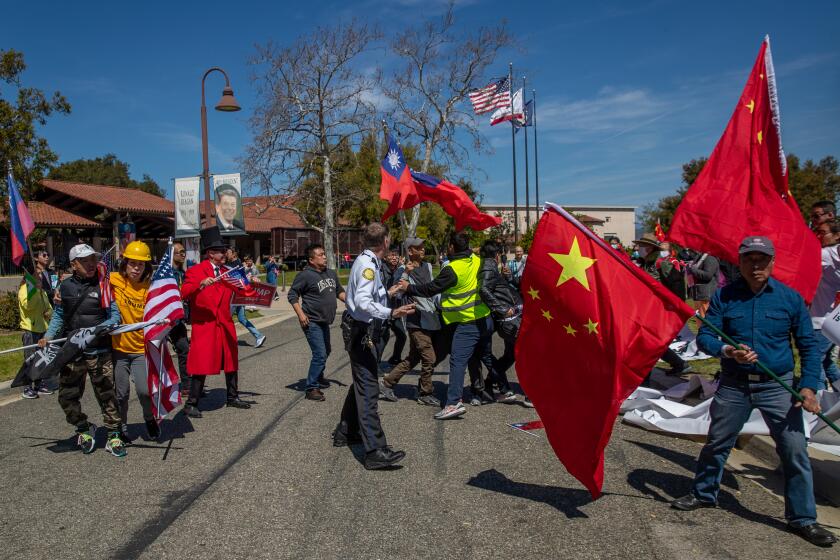China flies fighter jets near Taiwan after island leader’s trip to U.S.

- Share via
BEIJING — China on Saturday sent warships and dozens of fighter jets toward Taiwan, the Taiwanese government said, in retaliation for a meeting between House Speaker Kevin McCarthy (R-Bakersfield) and the president of the self-ruled island democracy, which is claimed by Beijing as part of its territory.
The Chinese military announced the start of three-day “combat readiness patrols” as a warning to those who want to make Taiwan’s de facto independence permanent. The People’s Liberation Army gave no indication whether the patrols might include a repeat of previous exercises in which missiles were fired into the sea, disrupting shipping and airline flights.
McCarthy held talks with President Tsai Ing-wen on Wednesday in California, joining a series of international lawmakers who have met the Taiwanese leader to show support in the face of Chinese intimidation. Beijing responded Friday by imposing a travel ban and financial sanctions against American groups and individuals associated with Tsai’s U.S. visit.
On Saturday, eight warships and 71 planes were detected near Taiwan; 45 of the planes flew across the middle line of the strait that separates the island from the mainland, Taiwan’s Ministry of Defense said. They included Chengdu J-10, Shenyang J-11 and Shenyang J-16 jet fighters.
Additionally, the Chinese navy planned to hold “live fire training” in Luoyuan Bay in Fujian province opposite Taiwan, the local Maritime Authority announced Saturday. Ships are banned during the firing, due to take place on five dates over the next two weeks.
Taiwan split with China in 1949 after a civil war. China’s ruling Communist Party says the island is obliged to rejoin the mainland, by force if necessary. Beijing says contact with foreign officials encourages Taiwanese people who want formal independence — a step the ruling party says would lead to war.
Taiwanese President Tsai Ing-wen met in L.A. with House Speaker Kevin McCarthy, intensifying an intractable ideological divide among immigrants.
“This is a serious warning against the collusion and provocation between the ‘Taiwan independence’ separatist forces and external forces,” said a PLA statement. The “Joint Sword” exercises “defend national sovereignty and territorial integrity.”
Plans called for the exercise to include a destroyer, missile boats, ballistic missiles and land-based anti-ship missiles as well as early-warning, electronic warfare and tanker aircraft, according to the Global Times, a newspaper published by the Communist Party.
The Taiwanese military said it had activated missile defense systems and sent air and sea patrols to track the Chinese aircraft.
“We condemn such an irrational act that has jeopardized regional security and stability,” a Ministry of Defense statement said.
The United States has no official relations with Taiwan, a center for high-tech industry and one of the biggest global traders, but maintains extensive informal and commercial ties. Washington is required by federal law to ensure that the island of 22 million people has the means to defend itself if China attacks.
Military analysts suggest that a possible Chinese strategy is to pressure Taiwan to surrender by blocking sea and air traffic, preventing the United States, Japan or other allies from intervening or sending supplies.
On Saturday, the PLA was testing its ability to dominate the sea, air and information and to “create a situation of deterrence and suppression,” the mainland newspaper the China Daily said.
Taiwan and the mainland have multibillion-dollar trade and investment ties but no official relations.
“We will never leave room for ‘Taiwan independence’ separatist activities in any form and will definitely take resolute measures to defeat any foreign interference,” said Zhu Fenglian, a spokesperson for the Chinese Cabinet’s Taiwan Affairs Office, according to the official Xinhua News Agency. “Complete reunification of our country must be realized, and it can, without doubt, be realized.”
More to Read
Sign up for Essential California
The most important California stories and recommendations in your inbox every morning.
You may occasionally receive promotional content from the Los Angeles Times.














